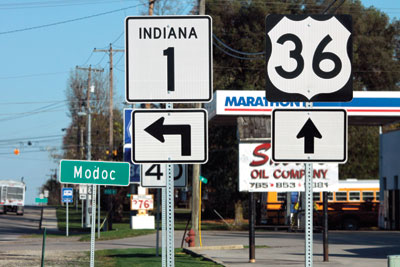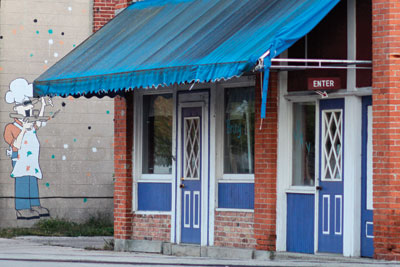This is the rural Midwest, offered up to you genuinely on a plate made of grass clippings and engine grease.

You might easily become lost traveling down Highway 1.
Despite being nominally first, the top of the list, it is marked only on the most precise of Indiana maps. Traveling south on this road you read signs that deliver you far from rural Indiana. Antioch, Fayette, Nottingham—these names belong in storybooks. Yet were it not for the uniform green signs identifying the small communities, often no more than a gas station and a house, you might forget that you are moving. Out the window you see nothing but the same lone tree in the middle of a cornfield you swore you just saw five minutes ago.
As you begin to fiddle with the radio to keep yourself awake, you notice a blinking light. Sweet civilization! You see a brick sign perched in someone’s yard, welcoming you to Redkey. Cornfields give way to houses situated comfortably against one another in a way that reflects the suburban aesthetic of larger cities. But the antiquated medleys of brick and vinyl siding, the aluminum-framed porch swings in the yards, do not.
This is the rural Midwest, offered up to you genuinely on a plate made of grass clippings and engine grease. You turn onto High Street, hoping to experience the throbbing heart of small-town America, and you see that the heart has stopped beating.
In the summers between college semesters, I often walk down High Street with my grandmother’s dog. Lady and I keep to the sidewalks, though even at rush hour we are safe walking down the center of the road. Redkey is empty. The businesses that try to fill the retail space fail within the first year, leaving the storefronts darkened like a toothless smile. Beyond the fire station, post office, and Masonic lodge, there is nothing but broken bricks stacked precariously in the shapes of buildings. Some of these buildings are partially destroyed, their walls and ceilings open to the sky. I stop in front of the
old pool hall and look up at the “open” sign that belies the vacancy inside. I know it has been closed down for years. Lady tugs at the leash and I turn to see her sniffing a baby’s stroller, left by some young mother just running in for a quick drink, its blue fabric seat dappled with yellow stains from the weather. Perhaps it was an easy thing to forget;
of course, I’ve never been a parent.
Next to the pool hall is a white building, small and squat with an adjoining garage. Through the window I see empty cans of WD-40 and grease-stained towels, as if someone never got the chance to finish cleaning up. It is an odd feeling, standing
in front of a building that, for my family members, is a source of countless memories. It is my grand-father’s old gas station, which he owned and operated for 35 years. My family would often speak of the station days. My sisters talked about venturing up for a free soda and candy bar, complementary with one of Grandpa’s stories. My mother recalled Grandpa smelling of grease and the sweat of hard labor when he walked in the door. Whenever we talked, all seated on plush sofas in my grandparents’ den, Grandpa would laugh, his eyes crinkled as he recalled those days long passed. His memories
were of a gas station that was but a small part of the thriving community of Redkey, a Redkey I have never known.
Bob’s Service Station closed down before I was born. Grandpa sold the station, sacrificing his passion for fixing to make more time for his family. My sisters were young at the time, yet not too young to forget the station. I, however, know the station only through other voices. Growing up, I would spend my mornings and afternoons with my grandparents while my parents worked. Some days I would work on “projects” with my grandpa, designing a wooden sword or slingshot to keep my innumerable supernatural foes at bay. These times were spent in Grandpa’s garage, where I combed through neatly arranged boxes of tools, cold and smooth and worn with age, under the orange neon glow of the old
station sign. There were remnants of the station everywhere—chipped pencils with the name stamped on the sides, emblazoned pads of paper, and magnets with the motto “Don’t Cuss, Call Us.” I picked up an old cigar box, its faded paper top bearing the half-effaced visage of royalty, and smelled tobacco and oil, as if the box had been steeped in the essence of the old station. I realized that Grandpa was, in some way, keeping the station alive, still fulfilling his duty as fixer and industrial jack-of-all-trades. Only this time it was his family, rather than his community, that he was serving.
As he grew older, Grandpa found it harder to work in his garage. The hammer became tiring to lift, and screws required just a little too much torque. In the last three years of his life, my grandfather began to step back, settling for a plastic-back lawn chair rather than a polished wooden creeper. From his perch he would direct me or my father to each tool and through each step of the process. His frustration showed. He would often get up to help, only to be halted by his trailing oxygen cord, his breath coming in staggered gasps. He was reliant on others now. Dust began to settle on the workshop; he resigned himself to a new role in the family.

On summer evenings my parents and I would cross our yard to visit my grandparents, who had moved next door in order to be closer to us. Sitting in his armchair, Grandpa would speak about the Redkey he knew. A simple list of amenities was enough to amaze me: Redkey once had a doctor’s office, hotel, restaurant, ice cream parlor, and multiple retail shops. People strode up and down the sidewalks looking through decorative storefront windows, children roamed in great giggling bands, and a man was deemed lucky if he found a place to park on the congested roadside of High Street. The more distinguished crowd filed into a restaurant called Shambarger’s, famous for its multiple-course $65-per-plate meals, yearlong waiting list, and a past clientele that included James Dean and Neil Armstrong.
And tucked into a corner of this stretch of Midwestern paradise, in a small white garage with an orange neon sign, my grandfather’s feet stick out from underneath a car. He rolls out from under the Ford, having identified and neutralized the source of a suspicious clinking noise. He wipes his hands on a blackened rag and talks to the customer, laughing off his request for a delayed bill and telling him to pay him when he can. They make the deal with a handshake.
On these nights, watching my grandfather’s eyes shine with tears, I began to understand what Redkey meant to him. He had given himself to it, blistered his hands and bruised his knees to preserve what he believed was a town worth the trouble.
My grandfather’s casket is ushered from the church on the back of an antique fire truck he helped maintain during his years as a volunteer firefighter. Through winding side streets we glide, silent as ghosts. I am in the second car, seated with my family, and I see that we are going down High Street. The silence breaks as a haunting sound fills the town, low and hoarse and then slowly rising to a pulsating bugle. The fire siren is sounding for my grandfather. Fire trucks and men adorned in full uniform line the street in front of the fire station with an empty uniform at their feet. The old fire truck stops for a brief second in front of a familiar white building, a building preserved by 35 years of care, a monument to diligence. For a moment,
I see the town as what it once was. A brilliant gossamer descends, shrouding the cracked sidewalks and covering the broken bricks, shattered windows, and abandoned stroller.
The procession begins to move again, the image remains, and my grandfather is delivered through his Redkey, passing through the forgotten streets to Highway 1, leaving the town to rest.
 You might easily become lost traveling down Highway 1.
You might easily become lost traveling down Highway 1. 